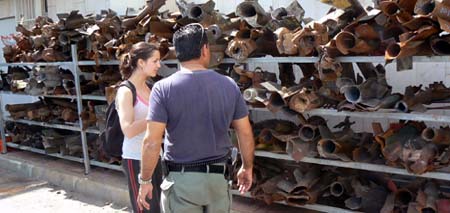 |

Courage and Determination
along Israel's Gaza Border
This website is dedicated to those individuals who live in
the Sderot, Israel, area, and are within range of the thousands
of rockets fired from Gaza in the past several years. |
This website was created in 2008 and taken offline in 2018.
Because of the recent Hamas atrocities I am putting this back online for historical purposes.
Israelis have suffered attacks from Hamas for many years.
|
People of Sderot and the Gaza Border area
Page three
|
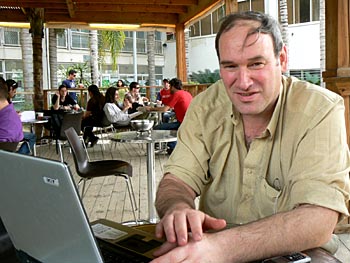 Joel
Joel |
Joel works for Sapir Academic College. "Let me tell you something," he says. "In the seven years that kassams have fallen here, the student population has grown. We are the largest public college in Israel."
I ask him why students come here, knowing there are dangers. "Here in this area people become aware of the difference an individual can make," he says. "They come here because of the vital human dimension they might not find in an urban setting."
I ask him what working in a college where the dangers of rocket fire exist can be like. "It's an unpleasant reality," he answers. "Hopefully this will come to an end. But that's the real victory: life keeps on going."
|
|
Vivian works at Kibbutz Nir-Am as a machine operator. She creates precision devices used in automobile starters by manufacturers around the world. "Look," she says, holding up a handfull of small elegantly-shaped silver objects. "Think of how many cars this is. And I help start all of them."
I ask her what she does when the 'tseva adom" (color red) alarm is given. She points across the factory floor to a place probably a hundred feet away. "We go into the hallway there," she says. "It is the safest place."
Vivian can be seen in the kibbutz store or walking around with her children. She seems to be always smiling. |
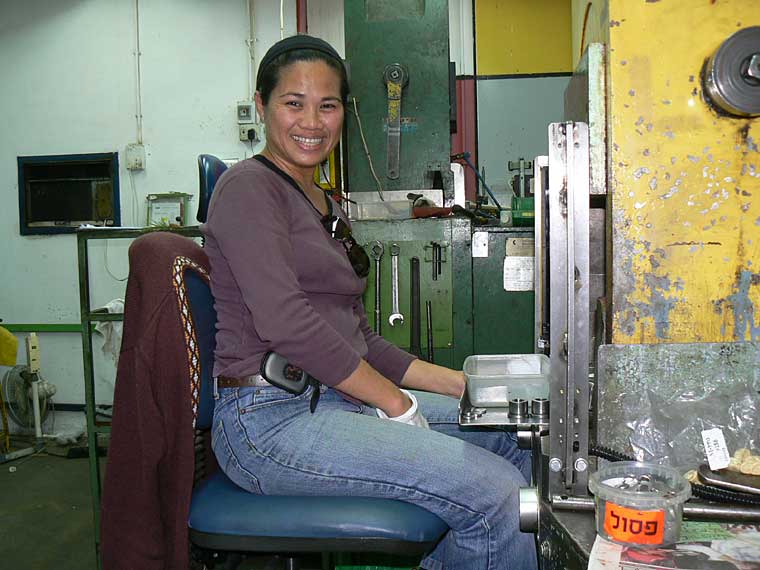 Vivian
Vivian |
|
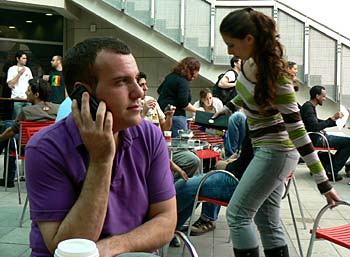 Tal takes a call
Tal takes a call |
Tal takes a call while we're having coffee at Sapir Academic College. Tal is my guide for this morning's walk through the school. He lives in Ashkelon, and the rockets have reached near his home, so both his school and homeplace are under attack. But he expresses no wish to leave Sapir's well-known film school. "There are many opportunities to learn here," he says. "And a lot of support. For example, we can rent the expensive equipment needed to make films, and not have to buy it like in other schools."
We speak briefly of politics. "Some of my friends consider me left-wing," he says. "I believe we must be willing to talk with everyone. This is not a war between big armies, like in the past. It's a guerilla war, and there is wrong being done on both sides. But I see no one to take control, and most are too angry to change their attitudes." And then he smiles and says, "You know, each Israeli is either a general or a chief-of-staff."
|
|
Suzan is a third-year student at Sapir Academic College in Middle Eastern Studies, and wants to be a teacher. She is the first of her family to go to college, and is a bridge between ancient Bedouin traditions and the modern world. She speaks openly and fluently in several languages, but for cultural reasons does not want a photo taken which would show her face. She has a beautiful, bright smile and an alertness which shines through her eyes.
"There are difficulties here," she answers when I ask about her time at Sapir. "The Jewish students do not look at me as part of their society. All of the classes are in Hebrew, even classes taught by Arab professors. And there are the kassams, the rockets which make life dangerous." I ask her how she can deal with all of this. "It takes a lot of strength," she answers.
Suzan is from the Bedouin village of Rahad, near Beer Sheva, and travels to Sderot each school day. "There are no other colleges nearby which have the programs I want, so I come here," she says. "And my family is very supportive, even with the dangers."
She moves easily between two cultures. "It's hard to tell who I relate to more," she says. "My life here is with Jewish students, but I have my own culture. And the Bedouin student group at Sapir is growing larger and stronger."
I ask her how she feels as a Muslim among Jewish students. "It's not us telling the Palestinians to shoot," she answers.
|
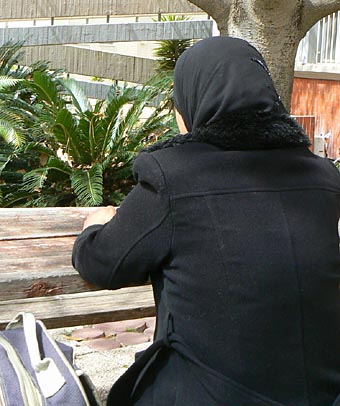 Suzan
Suzan |
|
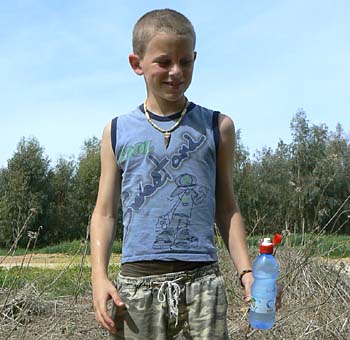
Gabi |
Gabi is ten years old. He has grown up on Kibbutz Nir-Am and has never known a time without rockets. His life has been filled with the explosions of kassam missiles falling all around him, one within ten feet of the room where he slept. In few other places in the world are children subjected to these conditions. He seldom knows which of several places he will sleep at night, or if there will be school the next day.
What are the effects of growing up like this? In Gabi's mother's words: "The effect has been most obvious on our children. At home: bedwetting, aggressive behaviour, extreme moodswings, insomnia, loss of appetite . . . and at school: lack of concentration, absenteeism, hyperactivity, outbursts of anger and physical and verbal aggression."
But Gabi is a child filled with great joy, in spite of what he is living through. He takes great delight in the out of doors, riding his bike and playing sports, and he has become an expert in aggravating his older sisters. But the long-term effects on these "children of the kassams" is still to be learned. |
|
|
|